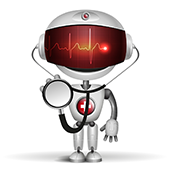 Artificial intelligence (AI) has the potential to radically change the face of the healthcare industry – in fact, it already has. Here are some of the ways that AI has benefited medical professionals and patients alike.
Artificial intelligence (AI) has the potential to radically change the face of the healthcare industry – in fact, it already has. Here are some of the ways that AI has benefited medical professionals and patients alike.
Virtual personal health assistants
At the helm of the AI revolution are virtual personal health assistants. A lot of people are already using such apps through their smartphones, wearable devices, computers, and other gadgets to keep track of their heart rate, blood pressure, and diet.
Virtual health assistants can also set a doctor’s appointment for you and remind you about it. They can document your symptoms so you can relay them to your doctor easily and efficiently.
The proliferation of smartwatches and other wearables that utilize AI also helps doctors monitor patients with early-stage heart disease. This enables them to detect potentially life-threatening episodes and deliver the proper treatment earlier, increasing patients’ chances of survival.
Healthcare bots
Healthcare bots are another AI-powered tech making waves in the healthcare industry. These provide quick answers when a patient’s primary healthcare provider is not immediately available. Accessible via the internet or over the phone 24/7/365, bots can ask patients about their medical history, allergies, and medical concerns, and provide immediate, affordable, and legitimate medical advice.
AI research and development is also making patient-physician and physician-physician interactions more efficient. Now available on the market are AI-powered apps that let doctors better understand their patients’ conditions, allowing them to provide better feedback and overall care. There are also apps that let healthcare providers compare their prescribing behaviors with others who are treating or who have treated the same condition.
What’s more, bots help healthcare providers minimize administrative and billing tasks, so they can focus more on medical care.
Health coaching
People with chronic illnesses can gain a lot from using virtual health coaches. For example, patients with diabetes, chronic obstructive pulmonary disease, asthma, and other long-term conditions can find the assistance they need from an AI coach that regularly monitors and analyzes their vital statistics and behaviors. A virtual coach can also provide accurate dietary and medical advice based on a patient’s health data.
These are just some of the ways that AI is transforming the healthcare industry. For questions about how your healthcare organization can leverage AI and other technologies, drop us a line today.



